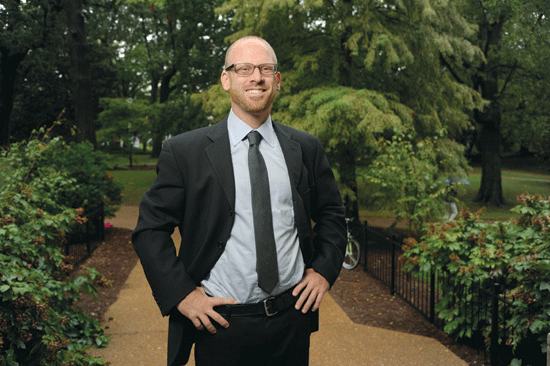New center director explores connections between humanities and medicine

Jonathan Metzl was born into medicine but is drawn to the humanities. He’s still insisting on having it both ways.
The new director of Vanderbilt’s Center for Medicine, Health and Society is the son of a pediatrician and a psychoanalyst. Two of his three brothers are doctors.
“[rquote]I was always the humanities kid in a medical family,” Metzl said. “I’ve been jumping back and forth across that line my whole career. I was always looking for a way to fuse it all together.”[/rquote]
His first career ambition was to be a psychiatrist, “because you could be a doctor without getting blood on your clothes,” Metzl said. As his education progressed, he aspired to a more ambitious combination of his interests.
It took a healthy work ethic to keep both on the front burner during his university education, said Metzl, who grew up in Kansas City, Mo.
“I went to a six-year medical school (at the University of Missouri) and I was the first dual humanities major at the school,” he said. “I ultimately earned B.A. degrees in both biology and English literature in addition to my medical degree.” During his medical residency at Stanford University, he went to night school and earned a master’s in poetry, then went to the University of Michigan where he earned a Ph.D. in American studies while also working as a psychiatrist.
This background made him an ideal candidate when Vanderbilt began its search for a new director for the Center for Medicine, Health and Society. The interdisciplinary center seeks to link the social sciences and humanities to Vanderbilt’s academic medical center in undergraduate and graduate education, and cultivate dialogue among research and teaching faculty committed to exploring links among the humanities, social sciences and academic medicine.
“Dr. Metzl is uniquely qualified to lead this promising interdisciplinary center,” said Carolyn Dever, dean of the College of Arts and Science. “He models innovation in our understanding of health, medicine and culture and will open new frontiers in research and teaching at Vanderbilt and beyond.”
There is no doubt that how disease and illness are perceived and experienced can affect outcomes, Metzl said, citing Stanford research that showed that cancer patients involved in group or narrative therapy survive longer.
“We often think of illnesses being defined in a laboratory by scientists or in a clinic by doctors,” Metzl said. “[lquote]But definitions of health and illness are also shaped by cultural milieus, social contexts, market forces, blind assumptions and even unconscious biases in ways that have profound implications for individuals and societies.”[/lquote]
For example, Metzl’s first book, Prozac on the Couch, explored how the condition of depression has evolved from the 1950s to the present. He studied pharmaceutical advertisements, news articles and other cultural artifacts to show how drugs such as Valium and Prozac became increasingly prescribed for women and marketed as treatments for “angry feminists.”
He did a similar study of schizophrenia in his second book, The Protest Psychosis, which illustrated how that condition moved from being the province of white women (as shown in popular 1940s films such as The Snake Pit) to that of “angry black men.”
“It increasingly became the diagnosis of black men involved in the black power movement,” Metzl said.
Metzl views cultural knowledge as increasingly important to the training of physicians, because “increasingly, patients come into doctors’ offices with cultural questions in mind,” he said. “They’ve seen an advertisement on television for medication, or they’re someone from a race or ethnic group that’s different than the physician, or they come in with pre-formed attitudes from the Internet about what treatments they want.”
Metzl comes to Vanderbilt and the Center for Medicine, Health and Society from a position as director at the University of Michigan’s Program in Culture, Health and Medicine. He is in the process of hiring new faculty, with ambitious goals to add structure to the undergraduate program and grow the graduate program.
“My No. 1 goal is to make the center a research as well as a teaching center,” he said. “I want to establish collaborations with people in the community.
“Nashville is a good place to be this kind of conduit, because it shapes so much of the national health debate due to the strength of its academic climate and its vital business and cultural infrastructure.”
See the complete list of new faculty for 2011-12.